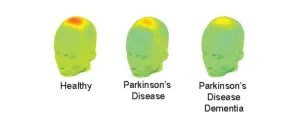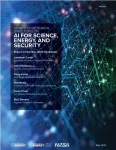(Press-News.org) A few minutes of data recorded from a single electrode placed on top of the head may be sufficient to predict thinking problems, including dementia, in patients with Parkinson’s disease (PD). The finding from a new University of Iowa study might help improve diagnosis of cognitive disability in PD and develop new biomarkers and targeted therapies for cognitive symptoms of the disease.
“Cognitive decline, including dementia, is a significant and underappreciated symptom of Parkinson’s disease. Around 30% of patients can have cognitive symptoms at the beginning of the disease, and up to 80% will have cognitive problems at some point in their disease,” says Nandakumar Narayanan, MD, PhD, associate professor of neurology at the UI Carver College of Medicine and senior author of the new study, which is published in the Journal of Neurology, Neurosurgery & Psychiatry. “Furthermore, although we have quite a few effective treatments for the motor symptoms of Parkinson's, including medical therapies and deep brain stimulation, we have very few treatments for the cognitive aspects of Parkinson's disease.”
EEG: a potential tool for predicting cognitive function in Parkinson’s
The brain recordings were made using a very old, widely available technology called electroencephalography (EEG), which measured low-frequency brain waves, known as delta and theta waves, in the frontal region of study participants’ brains. The UI team found that reduced strength of these specific brain waves when a patient is required to engage in thinking is strongly linked to cognitive dysfunction in PD. The findings suggest that EEG, which is also inexpensive and non-invasive, might be useful for diagnosing cognitive impairment in PD patients.
“Traditional methods for diagnosing cognitive problems often involve time-consuming pen and paper tests and require a neurologist to administer and interpret the tests. In addition, because these traditional tests can be ‘learned,’ they cannot be used repeatedly over time for the same patient,” says Narayanan, who also is a neurologist with UI Health Care and a member of the Iowa Neuroscience Institute. “In contrast, EEG can be done continuously over several hours or days. It can be applied in nursing homes, or patient’s homes, and it gives you a richly featured description of a patient's cognitive status.”
The EEG measurements might also be useful for monitoring and fine tuning the cognitive side effects of medications and brain simulation used to treat for Parkinson's disease. Eventually, EEG could even provide a basic assay to determine whether new treatments for PD are effective at improving cognitive function.
Diminished brain signal linked to cognitive problems in Parkinson’s
Lastly, the study, which is one of the largest to date, involving 100 PD patients across the full spectrum of cognitive function from healthy to dementia, and 49 demographically similar control participants, reveals a fundamental insight into the role of the brain signal being measured by the EEG electrode.
All the participants completed three different tasks that are commonly used to assess cognitive control, and while they were doing the task, a single EEG electrode measured the strength of the low frequency delta and theta brain waves from their frontal cortex.
Narayanan’s team found that diminished cognitive function was correlated with diminished strength of low frequency brain waves while the patient was doing a task. Importantly, it did not matter which cognitive task the patient was doing during the measurement.
“Surprisingly, the effect was seen simply because the patient was required to pay attention to a cue and respond. I think this is the deep insight into why Parkinson’s patients have cognitive problems: they fail to engage these basic response processes in the brain,” Narayanan explains.
“That was very surprising to us, and it's helpful because it means we might be able to get information about cognitive function using the simplest version of this task where there's a cue, and the patient has to engage and respond. That process— cue, engage, respond—might be enough to determine where patients are on the cognitive status scale and whether they have the potential to improve.”
Narayanan says this insight might also be an opportunity to help patients. Potentially “cueing” Parkinson's patients to engage in a task— whether it’s walking, talking or thinking, might improve how well they perform the task. If this is true, it would have important implications for the way rehabilitation, occupational, and speech therapists help patients with PD.
The next steps for Narayanan’s team are to investigate the mechanisms that link diminished delta and theta brain waves to worse cognition in PD, and to better understand how EEG technology might be used to improve diagnosis or even treatment of cognitive dysfunction in patients with PD.
In addition to Narayanan, the research team included Arun Singh, PhD, at University of South Dakota; Rachel Cole, Arturo Espinoza, and Jan Wessel at the UI; and James Cavanagh at the University of New Mexico. The research was funded in part by grants from the National Institute of Neurological Disorders and Stroke.
END
Brain waves may predict cognitive impairment in Parkinson's disease
2023-06-12
ELSE PRESS RELEASES FROM THIS DATE:
The Face Game: A citizen science project to learn how Artificial Intelligence will choose to appear to humans
2023-06-12
Online, profile pictures of human faces are everywhere, and they play a crucial role in shaping the first impression we make on others. Right now, AI gives people the digital tools to transform their online appearance in any way they desire, often making themselves look younger or more attractive. But this is just the beginning: AI is not only helping us play this face game amongst ourselves, but it is also learning the game from us and quietly deciding which face it will showcase as itself when interacting with us.
To better understand these mechanisms, researchers from the Max Planck ...
Ethics & Human Research, May-June 2023
2023-06-12
Making an Advance Research Directive: An Interview Study with Adults Aged 55 and Older with Interests in Dementia Research
Nola M. Ries, Briony Johnston
Many people with dementia are interested in taking part in research, including when they no longer have capacity to provide informed consent. Advance research directives (ARD) enable people to document their wishes about research participation prior to becoming decisionally incapacitated. However, there are few available ARD resources. This Australian interview study elicited the views of people aged 55 years and older about the content of an ...
Visionary report unveils ambitious roadmap to harness the power of AI in scientific discovery
2023-06-12
Innovations in artificial intelligence (AI) are rapidly shaping our world, from virtual assistants and chatbots to self-driving cars and automated manufacturing. Seizing on the potential of AI to transform science, the nation’s leading experts in science and technology have released a blueprint for the United States to accelerate progress by expanding its capabilities in AI and big data analysis.
“AI for Science, Energy, and Security” lays out a comprehensive vision ...
Masai giraffes more endangered than previously thought
2023-06-12
UNIVERSITY PARK, Pa. — Giraffes in eastern Africa may be even more endangered than previously thought. A new study led by researchers at Penn State reveals that populations of Masai giraffes separated geographically by the Great Rift Valley have not interbred — or exchanged genetic material — in more than a thousand years, and in some cases hundreds of thousands of years. The researchers recommend that the two populations be considered separately for conservation purposes, with separate but coordinated conservation efforts to manage each population.
Populations of giraffes have declined rapidly in the last thirty years, with ...
WVU research shows how much pharmaceutical companies are capitalizing on rare drug incentives
2023-06-12
Drugs used to treat rare conditions are earning pharmaceutical companies almost as much as those marketed to the general public, according to a researcher at West Virginia University. Sean Tu, a College of Law professor found lucrative so-called “orphan” drugs earn manufacturing tax credits, have longer patent exclusivities and face easier Food and Drug Administration review.
Orphan drugs treat diseases that affect fewer than 200,000 Americans. In addition to tax credits, Congress has incentivized the pharmaceutical companies that manufacture orphan drugs with a waiver of ...
Planet orbiting 2 stars discovered using new technique
2023-06-12
COLUMBUS, Ohio – An international team of astronomers is the first to apply an old technique to discover a new type of planet that orbits two stars – what is known as a circumbinary planet.
As an added bonus, researchers found a second planet that is orbiting the same two stars, which is only the second confirmed multi-planet circumbinary system found to date. The study was published today in the journal Nature Astronomy.
Circumbinary planets were once relegated to only science fiction, but thanks to data collected from NASA’s Kepler mission, astronomers now know that multiple star systems are ...
Railways could be a key 'utility player' for backup power
2023-06-12
– By Christina Nunez
The U.S. electric grid faces simultaneous, evolving pressures. Demand for power from the grid is increasing as people adopt electric cars and building energy is transitioned from gas to electricity. At the same time, climate change is driving more extreme weather. Events like the 2020 heat wave that led to rolling blackouts in California are relatively infrequent, but they are happening more often – and utilities need to be ready for them.
New research points to a flexible, cost-effective option for backup power when trouble strikes: batteries aboard trains. A study from the U.S. Department of Energy’s Lawrence Berkeley National Laboratory ...
Hines studying male victims of intimate partner violence in racial/ethnic minority communities
2023-06-12
Denise Hines, Associate Professor, Social Work, received funding for the study: "Understanding Male Intimate Partner Violence Victims from Racial/Ethnic Minority Communities."
Hines will lead a four-phase study on the experiences of male victims of intimate partner violence, with a specific focus on men from racial/ethnic minority communities.
She will conduct the study in four, simultaneous phases.
In Phase 1, Hines will conduct a survey study of male Intimate Partner Violence (IPV) victims, including 300 White men, 300 Black men, and 600 Latino men from both immigrant and non-immigrant communities within the United States. The survey will ...
Becker receives funding for scientific support in solar physics
2023-06-12
Peter Becker, Professor of Astrophysics and Space Sciences, received funding for: "Scientific Support in Solar Physics, Remote Sensing, Space Weather, High-Energy Astrophysics, and Associated Scientific Fields."
As part of this project, Mason researchers will conduct research in collaboration with the Naval Research Laboratory (NRL).
Areas covered by this research include: space sciences research (encompassing solar physics and studies of the integrated Sun-Earth system); computational physics and computational fluid dynamics; high-energy astrophysics; instrumentation ...
Baldimtsi conducting collaborative research focused on cryptographic accumulators and revocation of credentials
2023-06-12
Foteini Baldimtsi, Assistant Professor, Computer Science, received funding from the National Science Foundation for the project: "Collaborative Research: SaTC: CORE: Medium: Cryptographic accumulators and revocation of credentials."
The goal of the project is to design efficient revocation mechanisms for the Web PKI and beyond.
Baldimtsi and her collaborators will tailor cryptographic accumulators to the problem of credential revocation making certificate revocation mechanisms ...




